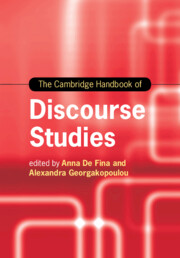Book contents
- The Cambridge Handbook of Discourse Studies
- Cambridge Handbooks in Language and Linguistics
- The Cambridge Handbook of Discourse Studies
- Copyright page
- Contents
- Figures
- Tables
- Contributors
- Preface
- Part I (Con)Textualizing Discourses
- Part II Perspectives and Modes of Analysis
- Part III Discourse Materialities and Embodiment
- Part IV (Trans)Locations and Intersections
- 17 Transnationalism, Globalization and Superdiversity
- 18 Translanguaging and Momentarity in Social Interaction
- 19 Intersectionality, Affect and Discourse
- 20 Expanding Academic Discourses: Diverse Englishes, Modalities and Spatial Repertoires
- Part V Ethics, Inequality and Inclusion
- Part VI Discourses, Publics and Mediatization
- Index
- References
17 - Transnationalism, Globalization and Superdiversity
from Part IV - (Trans)Locations and Intersections
Published online by Cambridge University Press: 28 September 2020
- The Cambridge Handbook of Discourse Studies
- Cambridge Handbooks in Language and Linguistics
- The Cambridge Handbook of Discourse Studies
- Copyright page
- Contents
- Figures
- Tables
- Contributors
- Preface
- Part I (Con)Textualizing Discourses
- Part II Perspectives and Modes of Analysis
- Part III Discourse Materialities and Embodiment
- Part IV (Trans)Locations and Intersections
- 17 Transnationalism, Globalization and Superdiversity
- 18 Translanguaging and Momentarity in Social Interaction
- 19 Intersectionality, Affect and Discourse
- 20 Expanding Academic Discourses: Diverse Englishes, Modalities and Spatial Repertoires
- Part V Ethics, Inequality and Inclusion
- Part VI Discourses, Publics and Mediatization
- Index
- References
Summary
Transnationalism, globalization and superdiversity are constructs used for thinking about flows of people, information, capital, texts and ideas, how they are connected and the effects of these flows on social relations. While there are many differences in these constructs, this entry highlights commonalities of focus, intellectual roots and methods used to analyze flows and connectivity. I start by noting that much of the work carried out in this area was done by sociologists, anthropologists and those working in cultural studies, most of whom had little interest in how communicative activity figured in generating and sustaining flows, what such communicative activity looked like or how the communicative repertoires of mobile people opened or closed future life world potentials. I then go on to point out that, within sociolinguistics, the use of these concepts and the study of the phenomena they refer to have been characterized by a constant drive to understand connections between communicative events that are part of these flows, how and why different communicative events are valued, and how and why such differences can create inequality. In doing so, I point out that much of this scholarship has led to the creation of new concepts and invitations to reconceptualize how we think about language in social life.
Keywords
- Type
- Chapter
- Information
- The Cambridge Handbook of Discourse Studies , pp. 377 - 393Publisher: Cambridge University PressPrint publication year: 2020
References
Further Reading
This provides a comprehensive discussion of contemporary semiotics.
This explores the sociolinguistics of superdiversity, as do the two works that follow (Arnaut et al. 2016; Blommaert and Varis 2015).
For a survey of recent directions and conceptual work being undertaken in the area of language and transnationalism, see this special edition, in particular the article on transnational identity.
This discusses the sociolinguistics of superdiversity.
This deals with the area of language and globalization as it relates to centers and peripheries.
This also explores the sociolinguistics of superdiversity.
This looks at language and globalization relative to centers and peripheries.
References
- 1
- Cited by

